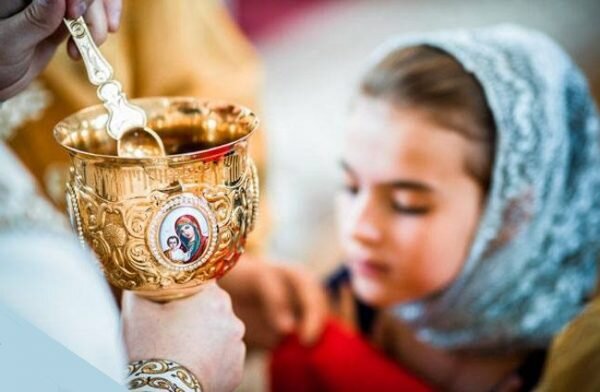The Divine Liturgy is centered around the partaking of the Eucharist. This is the main purpose of the Liturgy. The 9th Apostolic Canon says, “All the faithful who enter and listen to the scriptures, but do not stay for prayer and Holy Communion must be excommunicated on the grounds that they are causing the Church a breach of order.” How often do you sin? If you are honest with yourself as a Christian, you will acknowledge that you sin constantly. Sin is a part of your life. For the Christian, if sin is a part of our life, so too, must forgiveness be a part of our life. Constant sin requires constant forgiveness. “If we say we have no sin, we deceive ourselves and the truth is not in us.” (1John 1:8). The Eucharist, approached in the correct manner, takes away our sin and gives us the strength to draw closer to our God. What is the correct manner?
The answer is found in the Liturgy itself when the priest presents the Chalice and intones: “With the fear of God, with faith and with love, draw near!” If you do not have a valid reason for not partaking, you are obligated to receive the Eucharist. The problem with many Orthodox today is that they have reversed the concept. Today, many feel as if they cannot participate unless they have a good enough reason. This is contrary to what the Church teaches. You must participate unless you have a valid reason not to. To live a spiritual life of infrequent participation in the Eucharist means spiritual sickness. Are you spiritually sick? If you are, the Eucharist can help you (along with prayer, fasting, and confession). Maybe you fail to be regular in your partaking of the Eucharist because you feel unworthy. In this case, the question may be asked; when will you be worthy? Of course, if you wait until you are worthy, forget it, you will never be able to approach the Chalice.
One of the reasons we must constantly go forward is precisely because we are unworthy. Are you aware that there does exist someone who stands to gain by your staying away from the Chalice? That person is the devil. The longer you stay away from the Eucharist, the stronger the devil’s influence in your life. Do you want to destroy the devil? Then receive Jesus Christ! The more you consume Him, the more He will consume you. Consume Jesus Christ before the devil consumes you.
How should I fast before receiving Holy Communion?
Fasting is a spiritual discipline which was and is intended to enhance our participation in the Eucharist – it is not to be seen as an excuse to keep away from the Chalice. Fasting is a discipline which is not restricted only to food. It is more than simply not eating. It is also not lying, stealing, cheating, committing adultery, gossiping, quarrelling etc. We must abstain from all forms of evil. To think that by only setting a few days aside to omit certain foods from our diet makes us worthy to receive the Eucharist is to be spiritually naive.
It is not uncommon to hear Orthodox Christians say they are fasting on Wednesday and Friday because they plan to take Communion at Sunday Liturgy. In reality, the practice of Wednesday and Friday fasting has never been purposefully linked to participation in the Eucharist. Orthodox Christians are required to fast on those two days of the week regardless if they are going to take Holy Communion or not. [The Holy Apostles Sixty-Ninth Canon of the Church]. This same Canon requires that fasting be maintained throughout Great Lent also. No mention is made of the Eucharist. In other words, regular fasting must be a way of life.
Many Orthodox Christians extend the Wednesday and Friday fast to Saturday. They reason that if they fast on Wednesday and Friday in preparation for the Eucharist on Sunday, it does not seem right not to fast on Saturday, the day prior to receiving Communion. However, in so doing, they violate the sixty fourth Canon of the Holy Apostles which specifically forbids ever fasting on Saturday, the day God rested after creation. Exceptions to this Canon – Holy Saturday and a few other major feast days should they fall on a Saturday. The Eucharistic Fast involves total abstinence from any food or drink in the morning prior to receiving the Eucharist. If therefore, you keep the Eucharistic Fast, and there exists no moral reason for you to stay away from Chalice, you become obligated to come forward and receive Christ as He is offered at the liturgy.
To assert that one has not fasted on the previous Wednesday and Friday and therefore cannot come forward for Communion, is, by itself, an insufficient cause to abstain from the Eucharist. So strongly did the Church feel about this that we find in the ninth Apostolic Canon of the Holy Apostle, the following: “All those faithful who enter and listen to the Scriptures, but do not stay for prayer and Holy Communion must be excommunicated, on the grounds that they are causing the Church a breach of Order”. The early Orthodox Church attended liturgy for one reason – the Eucharist.
St John Cassian, writes, “We must not avoid Communion because we deem ourselves to be sinful. We must approach it more often for the healing of the soul but with much humility and faith considering ourselves unworthy. Otherwise it is impossible to receive communion once a year, as certain people do such people manifest more pride than humility for when they receive, they think of themselves as worthy”.
Fasting was never intended to be a barrier to keep us from Christ, but a bridge to lead us to fuller participation in the life of Christ.


